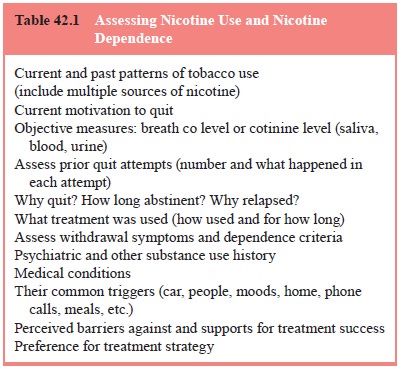Chapter: Essentials of Psychiatry: Substance Abuse: Nicotine Dependence
Evaluation and Assessment - Nicotine Dependence
Evaluation and Assessment
Before formal intervention is undertaken, it is
beneficial and important to perform a comprehensive evaluation to determine the
biological, psychological and social factors that are most significant in the
initiation and maintenance of nicotine use and dependence. Comprehensive
evaluation of the patient is outlined in Table 42.1.

Assessment of the psychiatric history is also
important. Numerous studies have shown the significance of current and past
depression in relation to smoking, as well as the increased prevalence rates of
cigarette smoking in patients with a variety of psychiatric disorders, such as
MDD, schizophrenia, and alcohol and substance abuse. The presence of these
comorbid disorders may also make successful smoking cessation less likely,
especially if undiagnosed and untreated.
Assessing the patient for a history of current
alcohol or other substance abuse is also important, as the prevalence of
smoking in persons with alcohol dependence as well as in other substance
abusers is much higher than in the general population. A careful medical
history should also be obtained. The presence of significant tobacco-related
medical illness can sometimes serve as crucial leverage to help motivate the
individual to attempt ces-sation. Current medications and medical conditions
may also be important considerations in determining the approach to cessa-tion,
especially with regard to pharmacotherapy. For example, a history of seizures
or an eating disorder is usually a contraindica-tion to the use of
bupropion/Zyban (nonnicotine pill medication). The individual should be
assessed for pulmonary symptoms and signs (cough), and if there is a long
history of significant nicotine use, pulmonary function tests should be
considered. The pres-ence of significant cardiovascular disease, especially a
history of recent myocardial infarction, is especially relevant to planning
psychopharmacological interventions. If the individual is already taking a
psychiatric medication, consider it important to realize that quitting smoking
may result in an increase in medication blood levels and side effects.
Related Topics